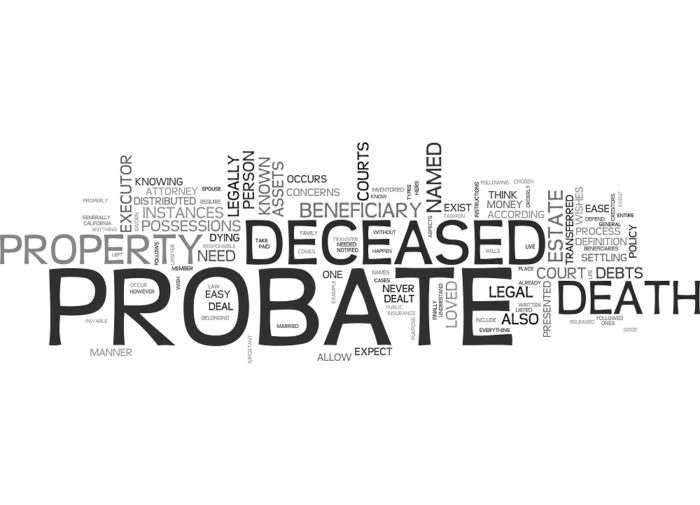
What happens when someone dies without a will? How is a transfer of property after death without a will in California carried out?
While dying without a will is rarely ideal, it is a common occurrence. When it happens, the state’s intestate succession laws generally will determine which of the decedent’s surviving heirs stand to inherit from their estate.
While intestate succession laws can help ensure a decedent’s assets don’t end up with just anyone, a carefully constructed will or trust instrument is almost always the preferable option, since it would provide the decedent with more control over the disposal of their assets after they die.
Discover how intestate succession laws work, what to expect during the probate process, and what steps you should take if a person dies without a will in California.
Section 1
Section 2
Section 3
Section 4
Section 5
Section 6
Probate in California Without a Will — How It Works
Probate is the court-supervised process by which an executor/administrator (also called a personal representative) is appointed to manage a decedent’s estate and eventually distribute it to the appropriate estate beneficiaries and/or heirs. The personal representative can make distributions only after they’ve completed all the steps of the estate administration process, including paying the decedent’s creditors.
To determine who receives a decedent’s money, property and personal belongings after death when there is no will, the probate court will first look to see if the decedent had arranged for their property to be disposed of via a trust, beneficiary designations, joint tenancy deed or other non-probate transfer methods. If they hadn’t, it’s likely a formal probate will be required. If a formal probate is required, the court will proceed to appoint an administrator to oversee the decedent’s intestate estate.
What Is Intestate Succession?
Intestate succession is the name given to the order of priority by which a decedent’s heirs will inherit from their estate if they died without a last will and testament. The state decides which heirs stand to inherit a decedent’s property when there is no will using intestate succession laws — which can be found in California Probate Code sections 6400 – 6455.
With intestate succession, the entitlement the decedent’s heirs have to the decedent’s estate assets is automatic and determined entirely by the law. Furthermore, since intestate succession laws can’t be contested, they can help protect the decedent’s assets from ending up in the wrong hands, given that they are guaranteed to pass to their closest living relatives after they die.
Who Becomes the Administrator of the Estate?
Who can administer the estate of a decedent? Are you curious how to become administrator?
When there is a death without a will in California, the court will usually appoint a close relative of the decedent (if they are able and willing to serve) to act as administrator of their estate. The duties of an administrator are virtually identical to the duties of an executor, with one notable difference: An administrator generally is bound to distributing the estate according to the laws of intestate succession, whereas an executor is generally bound to distributing the estate according to the terms of the decedent’s will.
First preference to serve as administrator typically is given to the surviving spouse; however, if the decedent did not have a surviving spouse or if their surviving spouse does not wish to serve, the court will have to appoint someone else. To view the order of priority to act as administrator, refer to California Probate Code 8461.
What happens if someone dies without a will and has no known heirs? In such instances, a public administrator may be appointed to oversee estate administration and locate heirs. If no heirs can be found, the decedent’s property could pass to the state.
Being administrator requires time and diligence. If you’re exceedingly busy, have too many other obligations or don’t feel confident in your ability to navigate the complexities of the role, it may be wise for you to refuse your appointment. If you neglect your administrative duties, there may be undesirable consequences. For example, you could be accused of fiduciary misconduct.

What Happens When Someone Dies Without a Will and Leaves Behind Family?
Even though most people are adamant about their family receiving their property after they pass, they often fail to leave instructions for how this transfer of property after death should take place. If you’re someone with concerns, such as “my parents died and left no will” or “there’s a death in my family and I have no idea what to do,” you can rest assured that, as a close family member of the decedent, the law is on your side.
While having a will can be beneficial for the decedent in helping to ensure their true intentions are honored, intestate succession laws can be just as effective if the decedent wished for their property to be divided amongst their closest surviving relatives. The only downside is that intestate succession laws determine the percentage share of the estate to which each heir is entitled, so if a decedent wanted to leave more of their property to a child who is financially struggling, they won’t have that option, as intestate succession would provide each of their children with equal percentage shares of their estate.
We go into more detail below about the inheritance each category of heir is entitled to under intestate succession laws.
Surviving Spouse
A key factor in determining which assets the surviving spouse will receive under intestate succession is the character of the assets, namely whether they are separate property or community property assets.While community property generally includes assets acquired by either spouse during their marriage (subject to some exceptions), separate property generally includes property that was acquired by a spouse prior to marriage, or as a gift or inheritance.
In general, the surviving spouse will inherit all of the community property in the event of their spouse’s death without a will. The spouse’s entitlement to the decedent’s separate property, on the other hand, will be determined by what other living heirs the decedent has (e.g., whether they have children) and get divided accordingly.
Children
Probate attorneys are often asked by the children of decedents: What am I entitled to if my parents died and left no will?
The inheritance a child will receive if a parent dies without a will in California depends on several factors, such as whether the decedent was married and/or whether they had other children. If the decedent has a surviving spouse, for example, the children generally will not be entitled to any of the community property, but they will be entitled to a percentage of the decedent’s separate property. On the other hand, if the decedent has several children but no surviving spouse, all the decedent’s property would be equally divided among the children.
Other Family Members
When a decedent does not have a surviving spouse or children, it will likely be their parents or siblings who inherit from their intestate estate. Grandchildren may also inherit in certain situations, particularly if their parent was a child or sibling of the decedent and is also deceased.
What Happens When Someone Dies Without a Will and Leaves Behind No Family?
While intestate succession laws go a long way in preventing a decedent’s assets from going to their state, there are certain situations in which it can happen. Generally, the only time the state of California will claim a deceased person’s property is if no surviving relatives of the decedent can be found.
Note that even cousins, great uncles, great aunts, nieces and nephews would be entitled to inherit a decedent’s assets before they’re given to the state.
Which Assets Are Excluded From the Intestate Estate When Dying Without a Will in California?
If there is to be a transfer of property after death without a will in California, it doesn’t necessarily have to be via intestate succession. This is because California’s intestate succession laws do not apply to all assets.
Assets Held in Joint Tenancy
When a property is held in joint tenancy, it means that it is owned equally by multiple parties; therefore, if a joint tenant dies, the surviving tenant(s) automatically will receive the deceased tenant’s interest in the property.
An advantage of joint tenancy versus some of the other ways of holding title is that property held in joint tenancy generally is not subject to probate. Nevertheless, there are instances in which a property once held in joint tenancy could be subject to probate and/or intestate succession (e.g., if the only surviving joint tenant dies without a will or if a joint tenant deed is challenged successfully and there is no prior valid will disposing of the property).
Transfer-on-Death Assets and Payable-on-Death Assets
Transfer-on-death assets (such as securities or vehicles with a designated beneficiary) and payable-on-death assets (such as bank accounts and life insurance policies with a designated beneficiary) are generally excluded from intestate succession because they have beneficiary designations. In other words, they are assets that the decedent had designated via a deed or another type of legally valid document to either be paid or transferred directly to a specific beneficiary upon their death.
Beneficiary designations on an asset can be difficult to contest, since beneficiaries can usually claim the asset as soon as the owner of the asset dies. However, if a beneficiary designation on an asset is successfully contested, and the owner of the asset died without a will, the asset could become a part of the decedent’s intestate estate and pass to their heirs.
Assets Held in Trust
The creation of a revocable trust is perhaps the most common probate avoidance mechanism in California. Any property that had been transferred into the trust will not be regarded as belonging to the decedent’s estate; therefore, it will not pass according to intestate succession laws.
Rather, the successor trustee will assume responsibility over the assets of the trust and distribute them to the trust beneficiaries in accordance with the terms of the trust. Similar to the other assets mentioned in this section, the assets of a trust may become subject to intestate succession if a trust is successfully invalidated by means of a trust contest.

Actions to Take if a Person Dies Without a Will in California
Once you understand what happens when someone dies without a will, it’s time to take action. By making the right moves in a timely fashion, you can decrease the odds of unforeseen issues arising and ensure that the estate administration process is carried out without incident.
While the administrator of the estate will be responsible for overseeing intestate succession and periodically reporting to the court, it does not mean heirs shouldn’t also play an active role in administration. They may wish to stay in close contact with the administrator and hire a beneficiary rights lawyer to protect their interests.
What to Expect During Probate When There’s a Death Without a Will
According to California inheritance law, without a will cannot take place unless all the required steps of the probate process (if probate is required) are carried out.
When there is a death without a will, the probate process is launched by obtaining the decedent’s death certificate and delivering it to the probate court in their county of residence.
During the initial probate proceeding, after the court has determined that there is no will, it will appoint an administrator for the estate. The person who serves in this role will have many duties, including:
- Preserving the decedent’s assets
- Satisfying all valid creditor claims
- Taking inventory of all the estate assets
- Preparing and filing estate accountings with the court
- Serving as a liaison to the probate court
- Ensuring that the assets are timely distributed to the decedent’s heirs
How Long Does Probate Take in California Without a Will?
The transfer of property after death without a will in California can be a complicated and lengthy process; however, because interested parties cannot dispute intestate succession laws in the same way they can dispute wills and trusts, it is possible intestate succession could take less time than estate administration with a will.
Because of all the duties the personal representative has during the probate process, California gives them a full year from their date of appointment to complete them (unless they had to file a federal estate tax, in which case they would have 18 months). In the event the personal representative cannot complete probate within a year, they must file a status report with the court and request an extension.
Advantages and Disadvantages of Intestate Succession Law
If you die without a will in California, intestate succession laws can help ensure your assets don’t end up with the state or in the hands of people who are not family, but there are still quite a few disadvantages of intestate succession to be aware of.
Perhaps the decedent wanted their kids to inherit most of their assets, but because of intestate succession, their surviving spouse will inherit almost everything. Or, perhaps the decedent wanted to leave their estate to a charity or someone who really needed it, but thanks to intestate succession laws, their estate will pass to a wealthy relative instead.
If a person dies without a will, they will also not have the option of disinheriting any of their surviving heirs, whereas with a will, they could have made their desire to disinherit a close relation explicit. Likewise, intestate succession cannot generally be contested since it is written into the law.
While there are certain instances in which the court may set aside intestate succession laws (e.g., if the court finds that an heir who stands to inherit under intestate succession perpetrated elder financial abuse against the decedent), it is rare for it to do so. Wills and trusts, on the other hand, can be contested if the documents meet one or more grounds for contesting a will or trust.
FAQs: Dying Without a Will in California
If you still have questions about what happens when someone dies without a will in California, check out the frequently asked questions below to find clear answers. For personalized guidance on intestate succession and probate, we recommend reaching out to our firm directly.
Who gets the keys to the house the day a parent dies with no will?
When a parent dies with no will, the parent’s estate generally assumes control over the keys to the house until the house is distributed to beneficiaries in accordance with their will, trust or intestate succession laws. Technically, no one has authority to take control over the decedent’s property, including their home, until the court appoints an administrator or a special administrator to take such action.
Who pays the credit cards while probate drags on?
The decedent’s estate is usually responsible for paying all of a decedent’s outstanding debts, including their credit card debt.
Can the kids sell a parent's car before Letters arrive?
No, kids cannot sell a parent’s car unless their name is on title or until they have been appointed executor or administrator.
Does the spouse get the whole estate if there are stepkids?
Not necessarily. If a decedent dies intestate, the surviving spouse will be entitled to 100% of all community property. With regard to the decedent’s separate property, a surviving spouse would generally receive 100% if the decedent left no children and at least 1/3 if the decedent left children or grandchildren, depending on the number of children or grandchildren surviving the decedent.
Do grandchildren ever jump ahead of living children if someone dies without a will?
No, grandchildren do not typically take priority over living children when someone dies without a will. That said, if a child of the decedent predeceased the decedent and left living grandchildren, those grandchildren usually can inherit in their deceased parent’s place.
How long do heirs wait for their check if someone dies without a will?
It usually takes around 12 to 18 months for heirs of an intestate estate to receive their inheritance, though timelines can vary based on the complexity of the estate and its assets.
Keystone Law can take the stress out of the probate process. Call us today.
When a person dies without a will in California, the process that ensues can be time-consuming and complex, especially if you are administrator of the decedent’s estate. Remember, you don’t have to embark on the probate journey alone: The professionals at Keystone Law can guide you.
If you have questions or are ready to hire an experienced estate litigation attorney, we invite you to request a free consultation. Our team of California estate lawyers is ready to help with your legal concerns.




